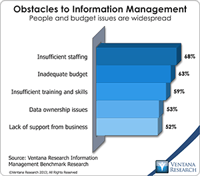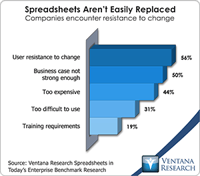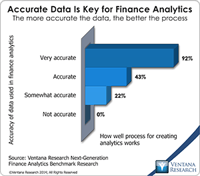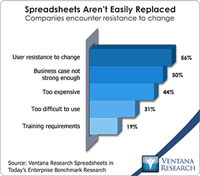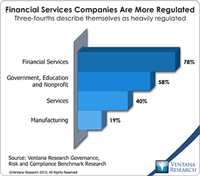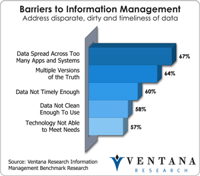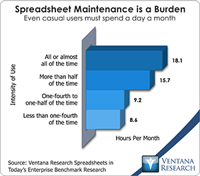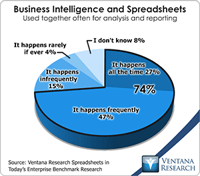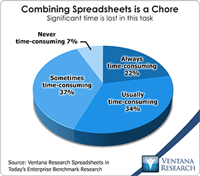When applying information technology to drive better business performance, companies and the systems integrators that assist them often underestimate the importance of organizing data management around processes. For example, companies that do not execute their quote-to-cash cycle as an end-to-end process often experience a related set of issues in their sales, marketing, operations, accounting and finance functions that stem from entering the same data into multiple systems. The inability to...
Read More
Topics:
Big Data,
Mobile,
ERP,
Office of Finance,
Operational Performance Management (OPM),
Operations,
Management,
close,
closing,
computing,
end-to-end,
Analytics,
Cloud Computing,
Data Management,
Business Performance Management (BPM),
CRM,
Data,
finance,
Information Applications (IA),
Information Management (IM),
Sales Performance Management (SPM),
Supply Chain Performance Management (SCPM),
FPM
One of the charitable causes to which I devote time puts on an annual vintage car show. The Concours d’Élegance dates back to 17th century France, when wealthy aristocrats gathered with judges on a field to determine who had the best carriages and the most beautiful horsepower. Our event serves as the centerpiece of a broader mission to raise money for several charitable organizations. One of my roles is to keep track of the cars entered in the show, and in that capacity I designed an online...
Read More
Topics:
Planning,
Office of Finance,
Operational Performance Management (OPM),
Reporting,
Self-service,
Budgeting,
dashboard,
Analytics,
Business Analytics,
Business Intelligence,
Business Performance Management (BPM),
Customer Performance Management (CPM),
Data,
Financial Performance Management (FPM),
Information Applications (IA),
Sales Performance Management (SPM),
Supply Chain Performance Management (SCPM),
Workforce Performance Management (WPM),
Financial Performance Management,
Microsoft Excel,
Spreadsheets
Our research consistently finds that data issues are a root cause of many problems encountered by modern corporations. One of the main causes of bad data is a lack of data stewardship – too often, nobody is responsible for taking care of data. Fixing inaccurate data is tedious, but creating IT environments that build quality into data is far from glamorous, so these sorts of projects are rarely demanded and funded. The magnitude of the problem grows with the company: Big companies have more...
Read More
Topics:
Big Data,
Planning,
Predictive Analytics,
Governance,
Office of Finance,
Operational Performance Management (OPM),
Budgeting,
close,
Finance Analytics,
Tax,
Analytics,
Business Analytics,
Business Intelligence,
CIO,
Governance, Risk & Compliance (GRC),
In-memory,
Business Performance Management (BPM),
CFO,
Financial Performance Management (FPM),
Information Applications (IA),
Risk,
Workforce Performance Management (WPM),
CEO,
Financial Performance Management,
FPM
Our benchmark research on enterprise spreadsheets explores the pitfalls that await companies that use desktop spreadsheets such as Microsoft Excel in repetitive, collaborative enterprise-wide processes. Because people are so familiar with Excel and therefore are able to quickly transform their finance or business expertise into a workable spreadsheet for modeling, analysis and reporting, desktop spreadsheets became the default choice. Individuals and organizations resist giving up their...
Read More
Topics:
GRC,
Office of Finance,
Operational Performance Management (OPM),
Reporting,
enterprise spreadsheet,
Analytics,
Business Analytics,
Business Collaboration,
Cloud Computing,
Governance, Risk & Compliance (GRC),
Business Performance Management (BPM),
Customer Performance Management (CPM),
Financial Performance Management (FPM),
Information Applications (IA),
Information Management (IM),
Risk,
Sales Performance Management (SPM),
Supply Chain Performance Management (SCPM),
Workforce Performance Management (WPM),
benchmark,
Financial Performance Management
Integrated risk management (IRM) was a major theme at IBM’s recent Smarter Risk Management analyst summit in London. In the market context, IBM sees this topic as a means to differentiate its product and messaging from those of its competitors. IRM includes cloud-based offerings in operational risk analytics, IT risk analytics and financial crimes management designed for financial institutions and draws on component elements of software that IBM acquired over the past five years, notably from ...
Read More
Topics:
GRC,
Office of Finance,
Operational Performance Management (OPM),
Chief Risk Officer,
CRO,
ERM,
OpenPages,
Business Analytics,
Business Collaboration,
Cloud Computing,
Data Governance,
Governance, Risk & Compliance (GRC),
IBM,
Business Performance Management (BPM),
compliance,
Customer Performance Management (CPM),
Data,
Information Applications (IA),
Information Management (IM),
IT Performance Management (ITPM),
Risk,
Supply Chain Performance Management (SCPM),
Financial Services,
FPM
Read More
Topics:
Office of Finance,
Operational Performance Management (OPM),
eDiscovery,
Exterro,
Data Governance,
Data Management,
Governance, Risk & Compliance (GRC),
Informatica,
Business Performance Management (BPM),
compliance,
Data,
Financial Performance Management (FPM),
Information,
Information Applications (IA),
Information Management (IM),
Risk,
Sales Performance Management (SPM),
Workforce Performance Management (WPM)
The spreadsheet is one of the five most important advances in business management over the last 50 years. It has changed all aspects of running an organization. It was the original “killer app” that made people go out and buy personal computers. So you see I’m enthusiastic about spreadsheets, but I realize they have limits that must be respected to work efficiently. One of the more important findings from our benchmark research Spreadsheets for Today’s Enterprise was about the time spent in...
Read More
Topics:
Office of Finance,
Operational Performance Management (OPM),
Reporting,
enterprise spreadsheet,
Analytics,
Business Analytics,
Visualization,
Business Performance Management (BPM),
Customer Performance Management (CPM),
Financial Performance Management (FPM),
Information Applications (IA),
Information Management (IM),
Risk,
Sales Performance Management (SPM),
Supply Chain Performance Management (SCPM),
Workforce Performance Management (WPM),
benchmark,
Financial Performance Management
The International Integrated Reporting Council (IIRC) recently published a draft framework outlining how it believes businesses ought to communicate with their stakeholders. In this context the purpose of an “integrated report” is to promote corporate transparency by clearly and concisely presenting how an organization’s strategy, governance, and financial and operational performance will create value for shareholders and other stakeholders in both the short and the long term. Such a report...
Read More
Topics:
Sustainability,
Office of Finance,
closing,
XBRL,
Business Analytics,
Business Intelligence,
Information Applications (IA),
Information Management (IM),
financial reporting,
FPM,
SASB,
SEC
I’ve been using spreadsheets for more than 30 years. I consider this technology tool among the five most important advances in business management of the 20th century. Spreadsheets have revolutionized many aspects of running an organization. Yet as enthusiastic as I am about them, I know the limits of desktop spreadsheets and the price we pay if we fail to respect those limits. The essential problem arises when people use desktop spreadsheets for purposes beyond what they were originally...
Read More
Topics:
Office of Finance,
Operational Performance Management (OPM),
Reporting,
enterprise spreadsheet,
Analytics,
Business Analytics,
Business Intelligence,
Governance, Risk & Compliance (GRC),
Visualization,
Business Performance Management (BPM),
Customer Performance Management (CPM),
Financial Performance Management (FPM),
Information Applications (IA),
Information Management (IM),
Risk,
Sales Performance Management (SPM),
Supply Chain Performance Management (SCPM),
Workforce Performance Management (WPM),
benchmark,
Financial Performance Management
I’ve been using electronic spreadsheets for more than 30 years. I consider this technology among the 20th century’s top five most important advances in business management. Spreadsheets have revolutionized every aspect of running any organization. A spreadsheet (specifically, VisiCalc) was the original “killer app” that made business people feel the necessity to buy a personal computer.
Read More
Topics:
Office of Finance,
Operational Performance Management (OPM),
Reporting,
enterprise spreadsheet,
Analytics,
Business Analytics,
Visualization,
Business Performance Management (BPM),
Customer Performance Management (CPM),
Financial Performance Management (FPM),
Information Applications (IA),
Information Management (IM),
Risk,
Sales Performance Management (SPM),
Supply Chain Performance Management (SCPM),
Workforce Performance Management (WPM),
benchmark,
Financial Performance Management
